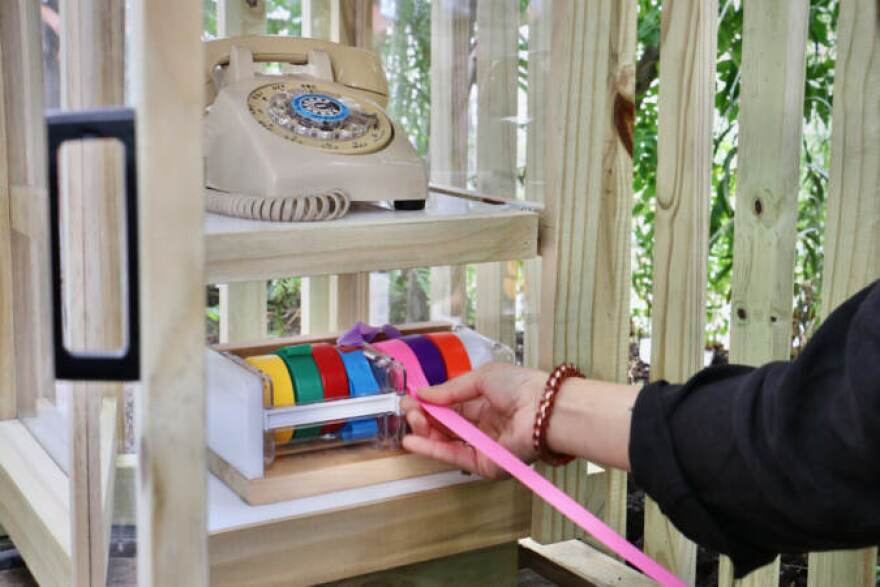A free public telephone has been installed in Philadelphia’s Rail Park – but it is wired to nothing.
Because it is connected to nobody, you can use it to speak to anybody.
“You can use the phone to talk to someone that is unreachable to you for whatever reason,” said Ravina Daphtary, co-creator of “The Thread.” “That experience can feel a little bit weird at first — maybe a little bit intimidating. But it also creates a lot of lightness. It’s a pathway you can use to heal.”

Similar to the exercise of writing an emotional letter with no intention of sending it, “The Thread” is intended to give people a means to speak to a deceased loved one as a form of grief therapy.
Grief therapist Beth Jellinek said this is what Philadelphia needs right now.
“We are all grieving in different ways, but particularly these last few years with the COVID pandemic, with the opioid epidemic, and deaths due to gun violence — [it’s] just devastated our city,” she said. “We really felt moved to create a space where we’re focused on care and healing — not necessarily all the trauma. It feels like the right time.”

“The Thread” is based on “Wind Phone” in Ōtsuchi, Japan, where garden designer Itaru Sasaki set up a phone booth in his garden in 2010 as a way to speak with his deceased cousin. Shortly after, Ōtsuchi was devastated by the 2011 tsunami, which killed over 15,000 people in the Tōhoku region, including about 2,000 in Ōtsuchi — which was around 10% of its total population.
Subsequently, the “Wind Phone” became something of a mecca for people hoping to cope with the massive loss of the disaster. An estimated 30,000 people have sought out the phone to speak to their loved ones. Versions of the “Wind Phone” have since appeared around the world, including in Ontario, Massachusetts, North Carolina, Colorado, Tennessee, and British Columbia.

Jellinek said talking out loud about your relationship, even if it’s an imaginary phone call, can be transformative.
“In my experience as a grief therapist, there’s so much power in narrative and voice,” she said. “I used the phone to call my dad who died 17 years ago, and it was like a different level of connection because it was such a familiar, tangible experience. I introduced him to my husband for the first time and I felt like they were getting along great.
“It might seem maybe not as impactful because it’s a disconnected phone but truly the embodied practice of using your voice out loud to connect is healing,” she said.

Part of the attraction of the original Japanese “Wind Phone” is its isolation. It sits in an obscure garden in a small town on the coast of Japan. Its global replicas are similarly in rural or out-of-the-way places. But as far as Annie Chiu-McCabe knows, no other “Wind Phone” variant was ever set up in an urban environment.
“Other phones, their iterations are in really remote, woods-filled areas,” said Chiu-McCabe, another co-creator of “The Thread.” “You almost need to get lost and trek to find your way to it.”
By putting “The Thread” in a downtown park on abandoned elevated train tracks, its creators intended to make tools for grief therapy available to as broad a range of people as possible.

“We’re trying to reach the people who’ve been most impacted by death, by loss in Philadelphia,” said Jellinek. “A lot of people who are in the city may not have access to open land and somewhere else in the state.”

There is an actual phone number associated with “The Thread” — an automated phone line with its number posted on signs at the makeshift phone booth. People have the option to call that number on their own cell phones and make an audio recording related to their feelings for their loved one. The recording may be shared in future online posts related to “The Thread.”
There are also resources listed for mental health services.
People can also make a more tangible gesture to their lost loved one: colored ribbons are available in the phone booth that can be tied to a nearby fence as a form of remembrance.
“The Thread” will be available at the Rail Park until September 23.

